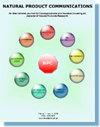复方黄芩颗粒治疗结直肠癌的药效学材料与机制:网络药理学、分子对接和细胞实验研究
IF 1.4
4区 医学
Q4 CHEMISTRY, MEDICINAL
引用次数: 0
摘要
背景:复方黄芩颗粒(CSRG)可用于治疗胃肠道疾病,包括结直肠癌(CRC)。研究表明,复方黄芩颗粒具有抗 CRC 的作用,但其确切的分子机制仍不清楚。研究方法本研究利用网络药理学和分子对接技术确定了南乳清中的活性成分,并评估了与 CRC 相关的基因和通路。然后,在体外观察 CSRG 对 HT29 细胞的影响。通过细胞计数试剂盒-8检测、Western印迹和流式细胞术与AnnexinV-FITC/PI双染实验,观察CSRG对HT-29细胞增殖、凋亡等作用的影响。此外,还检测了CSRG和IGF-I(PI3K/AKT激动剂)对HT-29细胞生物学行为的影响。结果柚皮苷、槲皮素、甘草查耳酮 A、醋酸苷、乌戈宁、黄芩苷、山柰醇和异鼠李素是 CSRG 的主要活性成分,它们通过五个基因影响 CRC:丝裂原活化蛋白激酶 3 和 1、肿瘤蛋白 53、信号转导和激活转录 3 以及 RELA 原癌基因、NF-kB 亚基。分子对接实验预测了 CSRG 中的活性成分对其目标靶点的活性,每种活性成分都能稳定地结合相应的 CRC 靶点。富集分析表明,CSRG在调控细胞凋亡和增殖过程中发挥了协同作用,多种通路参与了CSRG相关的CRC治疗。细胞实验结果表明,PI3k-Akt通路可能是关键通路。此外,还发现Tp53与细胞凋亡密切相关。此外,CSRG对HT29细胞恶性表型的抑制作用被IGF-I逆转。结论CSRG是一种含有多种成分的抗结肠癌草药,涉及多个靶基因和信号通路。CSRG能抑制结肠癌细胞增殖并诱导细胞凋亡,这可能与其抑制PI3K/Akt通路和激活Tp53通路有关。本文章由计算机程序翻译,如有差异,请以英文原文为准。
Pharmacodynamic Materials and Mechanisms of Compound Scutellariae Radix Granules for Colorectal Cancer: A Network Pharmacology, Molecular Docking and Cell Experiments Study
Background: Compound Scutellariae Radix Granules (CSRG) are used to treat gastrointestinal diseases, including colorectal cancer (CRC), which is the second leading cause of cancer-related deaths. Studies have demonstrated that CSRG have anti-CRC effects; however, the exact molecular mechanisms remain unclear. Methods: This study used network pharmacology and molecular docking to identify the active ingredients in CSRG and assess CRC-related genes and pathways. After that, the effect of CSRG on HT29 cells was observed in vitro. Cell Counting Kit-8 detection, Western blot, and flow cytometry with AnnexinV-FITC/PI double staining experiments were used to observe the effects of CSRG on the proliferation, apoptosis and other effects of HT-29 cells. Moreover, the effects of CSRG and IGF-I (PI3K/AKT agonist) on HT-29 cell biological behaviors were gauged. Results: Naringenin, quercetin, licochalcone A, acacetin, wogonin, baicalein, kaempferol, and isorhamnetin were the key active ingredients in CSRG, which affect CRC through five genes: mitogen-activated protein kinase 3 and 1, tumor protein 53, signal transducer and activator of transcription 3, and RELA proto-oncogene, NF-kB subunit. The molecular docking experiments predicted the activity of the active ingredients in CSRG against their intended target, each of which could stably bind the corresponding CRC target. The enrichment analysis indicate that CSRG played a synergistic effect in regulating the process of apoptosis and cell proliferation, and that multiple pathways were participated in CSRG-related CRC treatment. Cell experiments results demonstrated that the PI3k–Akt pathway may be critical pathways. Besides, Tp53 was found tightly linked to apoptosis. Moreover, the suppressive effect of CSRG on HT29 cell malignant phenotypes was reversed by IGF-I. Conclusion: CSRG are an anti-colon cancer herb containing multiple components, involving multiple target genes and signaling pathways. CSRG inhibited colon cancer cell proliferation and induced apoptosis, which may be related to its inhibition of the PI3K/Akt pathway and activation of the Tp53 pathway.
求助全文
通过发布文献求助,成功后即可免费获取论文全文。
去求助
来源期刊

Natural Product Communications
工程技术-食品科技
CiteScore
3.10
自引率
11.10%
发文量
254
审稿时长
2.7 months
期刊介绍:
Natural Product Communications is a peer reviewed, open access journal studying all aspects of natural products, including isolation, characterization, spectroscopic properties, biological activities, synthesis, structure-activity, biotransformation, biosynthesis, tissue culture and fermentation. It covers the full breadth of chemistry, biochemistry, biotechnology, pharmacology, and chemical ecology of natural products.
Natural Product Communications is a peer reviewed, open access journal studying all aspects of natural products, including isolation, characterization, spectroscopic properties, biological activities, synthesis, structure-activity, biotransformation, biosynthesis, tissue culture and fermentation. It covers the full breadth of chemistry, biochemistry, biotechnology, pharmacology, and chemical ecology of natural products.
Natural Product Communications is a peer reviewed, open access journal studying all aspects of natural products, including isolation, characterization, spectroscopic properties, biological activities, synthesis, structure-activity, biotransformation, biosynthesis, tissue culture and fermentation. It covers the full breadth of chemistry, biochemistry, biotechnology, pharmacology, and chemical ecology of natural products.
 求助内容:
求助内容: 应助结果提醒方式:
应助结果提醒方式:


